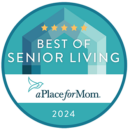Visitation Policy
Screening
PLEASE NOTE THAT VISITATION HOURS ARE UNRESTRICTED. If the doors are locked, please ring the doorbell and staff will assist you. Doors may be secured at various hours but are typically open between the hours of 8am and 8pm.
An ALF must screen all individuals who enter the facility prior to entry (except for emergency personnel), including staff at the start of their shift, any visitors, new residents, and residents returning to the facility for (this applies to Georgia only. No longer required for Texas as of 9/12 or Florida as of 9/20):
Fever, defined as a temperature of 100.4 Fahrenheit and above.
Signs and symptoms of COVID‐19
Residents are no longer required to be screened unless exposed to COVID‐19, are symptomatic, or under quarantine per CDC guidelines.
Residents are asked to report if they feel feverish or have symptoms of respiratory infection and coronavirus.
If a resident meets any of the screening criteria, implement increased infection control measures including quarantine as applicable and monitor for symptoms of COVID‐19 according to State and Local guidelines. (Use CDC quarantine tool to determine if needed and length of quarantine) https://www.cdc.gov/coronavirus/2019‐ncov/if‐you‐are‐sick/quarantine.html
Georgia only all visitors must wear a medical mask (no cloth masks allowed), no masks are required in Texas or Florida at this time unless an outbreak occurs. If an outbreak occurs, then masks will be required until under control.
The screening log might contain protected health information and must be protected in accordance with applicable state and federal law. The information might include at least: the date, the person’s name, current contact information, and the data from the screening (presence or absence of fever and symptoms). assisted living facility is not required to screen emergency services personnel entering the facility in an emergency.
Georgia only post signage at the entrance of the facility reminding individuals not to enter the facility prior to being screened. Do not restrict surveyors.
Visitors
Georgia only persons providing critical assistance must be allowed to enter the facility provided they pass required screening. Texas and Florida have no visitor restrictions.
These include:
Family members and loved ones of residents at the end‐of‐life;
Essential caregivers;
Emergency responders (do not screen in an emergency);
Persons with legal authority to enter, including:
Government personnel performing their official duties, including surveyors whose presence is necessary to ensure the ALF is protecting the health safety of residents and providing appropriate care;
Law enforcement officers (do not screen in an emergency) and
Representatives of the Long‐term Care Ombudsman’s Office and representatives of Disability Rights; and
Providers of essential services which include contract doctors, contract nurses, home health and hospice workers, health care professionals, contract professionals, clergy members and spiritual counselors, whose services are necessary to ensure resident health and safety.
This list is not exhaustive. A facility must use its best judgment to determine which persons are “essential” to protect the health and safety of a resident.
Regulatory Requirement/References
We adhere to the Florida Statute 408.823 – “No Patient Left Alone Act”
End of Life Situations
A resident, client, or patient who was living with family before being admitted to the provider’s care is struggling with the change in environment and lack of in-person family support.
The resident, client, or patient is making one or more major medical decisions.
A resident, client, or patient is experiencing emotional distress or grieving the loss of a friend or family member who recently died.
A resident, client, or patient needs cueing or encouragement to eat or drink which was previously provided by a family member or caregiver.
A resident, client, or patient who used to talk and interact with others is seldom speaking.
Rules 7 and 8 don’t apply to our setting they apply to infants and children.
Please reference the posted “No Patient Left Alone Act” in each community for further details.
Personal Visitors
ALFs must allow all residents who are COVID‐19 negative or positive to have personal visitors. COVID-19 positive residents may still have visitors, but their visitors will be encouraged to wear PPE. Visits can occur where adequate space is available as necessary to ensure physical distancing between other residents and visitors when necessary. The facility must ensure a comfortable and safe outdoor visitation area, considering outside air temperature and ventilation.
Visitors and residents in Texas and Florida are no longer required to wear masks, face coverings or PPE unless working with a COVID‐19 positive/symptomatic/COVID‐19 unknown or Local/State mandated. Georgia is still requiring masks at this time.
Visits are not required to be scheduled in advance. An ALF can have scheduled visits and unscheduled visits. ALFs can schedule personal visits in advance or permit personal visits that are not scheduled in advance, or both.
See Expansion of Reopening Visitation at 26 TAC §553.2003 (Texas) for all requirements.
All ALFs must:
offer a complete series of a one‐ or two‐dose COVID‐19 vaccine to residents and staff and document each resident’s choice to vaccinate or not vaccinate (“Offer” in this context means to administer, arrange/assist, OR educate/give information about the COVID‐19 vaccine AND document the resident’s choice to vaccinate or not vaccinate);
allow visitors of any age;
develop and enforce written policies and procedures related to visitation, including whether visitors and residents must wear a face mask, face covering, or appropriate PPE during visits.
inform residents and visitors of the facility’s infection control policies and procedures related to visitation.
give all residents equal access to personal visitors, end‐of‐life visitors and essential caregivers.
ensure comfortable and safe outside visitation areas, considering outside air temperature and ventilation.
provide hand‐washing stations or hand sanitizer to visitors and residents before and after visits.
facilitate visits in a way that allows cleaning and sanitizing common visitation areas.
Salon Services Visitors
An ALF can allow a salon services visitor (barber, beautician, or cosmetologist providing hair care or personal grooming services to a resident) to enter the facility to provide hair care or personal grooming services to COVID‐19 negative residents.
The salon requirements for salon visits.
(A) inform the salon services visitor of applicable policies, procedures, and requirements;
(B) maintain documentation of the salon services visitor’s agreement to follow
policies, procedures and requirements;
(C) maintain documentation of the salon services.
(D) document the identity of each salon services visitor in the facility’s records; authority, that is more restrictive than this rule the community in that area will abide by that rule.
Vaccination Status
The ALF can ask about a visitor’s COVID‐19 vaccination status but must not require any visitor to provide documentation of their COVID‐19 vaccination status as a condition of visitation or to enter the facility. A personal visitor may refuse to provide information about their vaccination status. Sodalis is NOT currently requiring vaccinations. A facility is a private business and should consult with their Legal and Human Resources area to address state and federal mandates regarding vaccines.
Visual Aid:
See below for the visitors allowed according to resident COVID‐19 status
Essential Caregivers (EC) ALFs are required to allow for all residents with any COVID‐19 status
Personal Visitors (not EC) ALFs are required to allow for residents with any COVID‐19
End‐of‐Life Visitors ALFs are required to allow for all residents with any COVID‐19 status
Providers of Critical Assistance ALFs are required to allow for all residents with any COVID‐19 status
Salon Service Visitors ALFs can allow for residents with COVID negative status
Infection Control
See Attachment 1: ALF COVID‐19 Response Infographics & Flowcharts, for visual aids outlining ALF response activities. Comply with all CDC guidance related to infection control.
(E) prevent visitation by the salon services visitor if the resident has an active COVID‐19 infection;
(F) cancel the salon services visit if the salon services visitor fails to comply with
the facility’s policy regarding salon services visits.
(j) If an executive order or other direction is issued by the State and or Local government, the President of the United States, another applicable
Establish infection control zones to keep resident cohort groups separate from each other and to limit movement of staff between the separate zones.
Cold Zones for COVID‐19 negative residents
Warm Zones for monitoring residents with unknown COVID‐19 status
Hot Zones for COVID‐19 positive residents
An ALF must have spaces for staff to doff and dispose of PPE used in a warm zone or hot zone, and wash hands or use hand sanitizer before entering a cold zone in the facility:
PPE
Maintaining a two‐week supply of PPE is no longer required. Make necessary PPE available in areas where care is provided to residents with COVID‐19 and residents with unknown COVID‐19 status. Put a trash can near the exit inside the resident room to make it easy for staff to discard PPE prior to exiting the room.
Cleaning and Disinfecting
Increase environmental cleaning. Clean and disinfect all frequently touched surfaces such as doorknobs/handles, elevator buttons, bathroom surfaces/fixtures, remote controls, and wheelchairs.
Make sure EPA‐registered hospital‐grade disinfectants are available. Refer to List on the EPA website for EPA‐registered disinfectants that have qualified under EPA’s emerging viral pathogens program for use against COVID‐19.
Provide supplies for recommended hand hygiene. Have alcohol‐based hand sanitizer with 60–95 percent alcohol easily accessible. Make sure sinks are well‐stocked with soap and paper towels for hand washing.
Review your infection control policies and procedures. Review your emergency preparedness and response plan and update as needed.
Ensure that any emergency plans specific to hurricanes or other natural disasters account for COVID‐19.
Staff
Staff must always wear proper PPE when caring for residents with COVID‐19 or unknown COVID‐19 status.
To encourage staff who are ill to stay home ALFs should enforce sick leave policies that do not penalize them with loss of status, wages, or benefits per company policy.
Require staff with symptoms of COVID‐19 to report sick by phone or other virtual method consistent with facility policy. Staff must not enter the facility until they meet the current CDC Guidance Risk Assessment at: https://www.cdc.gov/coronavirus/2019-ncov/hcp/guidance‐risk‐assesment‐hcp.html
If a staff member has a confirmed case of COVID‐19 they must not enter the facility until they meet the current CDC return to work criteria. (Go to link listed above)
In Georgia staff must always wear a facemask while inside the facility at all times. At this time Texas and Florida do not require the use of face masks unless there’s an outbreak or deemed otherwise by Local/State mandate. The CDC does not consider cloth face coverings to be PPE, nor adequate to prevent the spread of COVID‐19 and should not be used by staff. Develop a staffing contingency plan to implement if a significant number of staff are unavailable to work. Enforce sick leave policies for ill staff and health care providers.
If a staff member has a confirmed case of COVID‐19 they must not enter the facility until they meet the current CDC return to work criteria. Use this link‐ Guidance‐Risk Assessment.
Per CDC guidance, asymptomatic staff who have higher risk of exposure do may not need to be restricted from work.
Web Links are highlighted in yellow
Guidance‐Risk Assessment and CDC Strategies to Mitigate Healthcare Personnel
Staffing Shortages recommendations for Healthcare Personnel During the COVID‐19
Pandemic for possible exceptions and additional information.
Note: If a staff member was diagnosed with a different illness (e.g., influenza) and was never tested for COVID‐19, base their return to work on the criteria associated with that diagnosis, use above Guidance Risk Assessment.
Residents
Ask residents to report if they feel feverish or have symptoms of respiratory infection and coronavirus. Actively monitor all residents upon admission and at least daily for fever and symptoms of COVID19 in accordance with State and Local guidance. If a resident has fever or symptoms, implement increased infection control measures including quarantine as applicable.
Unknown Status or Overnight Stays out of Community
Residents with unknown COVID‐19 status must be quarantined per the CDC guidance on https://www.cdc.gov/coronavirus/2019‐ncov/if‐you‐are‐sick/quarantine.html
Per CDC guidance, an asymptomatic resident who is either fully vaccinated or had COVID‐19 in the previous three months and has fully recovered, does not have to quarantine, even if they had close contact with someone who has COVID‐19.
Fully vaccinated people who do not quarantine should still watch for symptoms of COVID‐19 for 14 days following an exposure. If they experience symptoms, they should be clinically evaluated for COVID19, including testing for COVID‐19, if indicated.
Leaving and returning
Residents have the right to leave and return to the facility for any reason, and the facility cannot restrict residents from exercising this right. The facility has a responsibility to inform residents of the increased risk of contracting COVID‐19 and the importance of safety precautions like avoiding crowds, washing hands often and maintaining physical distancing from others whenever possible, so ensure that the resident is making an informed decision.
Same day
A resident who leaves the ALF and returns the same day is not necessarily considered to have unknown COVID‐19 status. The resident’s COVID‐19 status is the same as it was when they left.
Activities and Dining
In Georgia entertainers, families and volunteer groups can enter the facility if they and the ALF adhere to the following: **Does not apply to Texas or Florida**
The ALF must screen each person entering the facility prior to entry. Only persons who pass the screening can enter the facility.
The ALF must document visitors in a log at the entrance of the facility
All individuals who enter the facility for the purposes of activities or dining are bound by the rules for personal visitors
Some examples of visitors joining in activities and dining:
A small group, such as members from a local club or a group of high school students who volunteer to participate in an activity with residents, such as putting up decorations or putting on a performance.
Family joining a resident for a meal at an individual family table that is adequately distanced from other residents’ family tables.
ALF staff taking residents in community buses to an event or an outing
Memory Care Units and Alzheimer’s Certified Units
Infection prevention strategies to prevent the spread of COVID‐19 are especially challenging to implement in dedicated memory care units and Alzheimer’s certified units where numerous residents with cognitive impairment reside together. These residents can have a difficult time following recommended infection prevention practices.
Changes to resident routines, disruptions in daily schedules, use of unfamiliar equipment, or working with unfamiliar caregivers can lead to fear and anxiety, resulting in increased depression and behavioral changes such as agitation, aggression, or wandering.
Follow recommended guidance below from the CDC for considerations regarding residents with dementia, in memory care or Alzheimer’s certified units.




